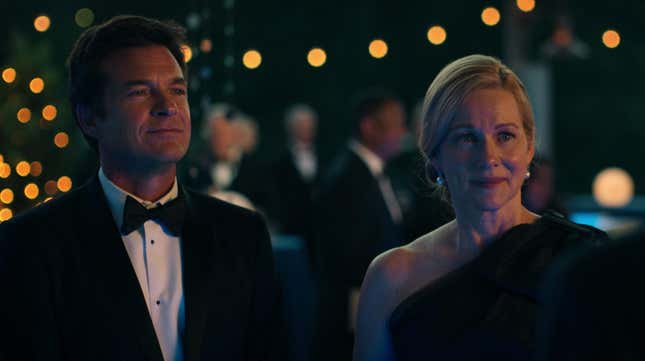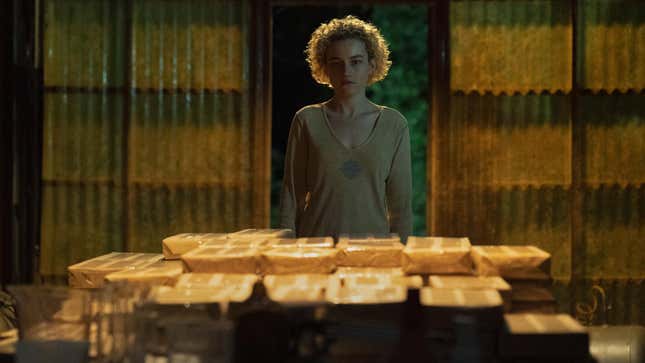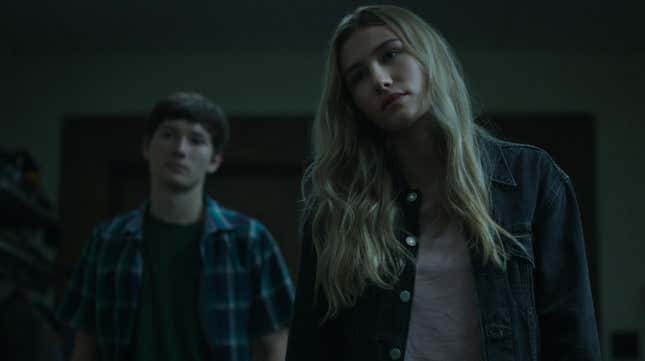
Ozark’s final episodes are baffling. Not because they don’t do exactly the sort of thing Netflix’s ludicrous crime thriller has been doing since 2017, but because they do so with a sentimentality that’s uncharacteristically sappy. For a drama boasting multiple jump-scare executions and the unhinged depths of antagonists like Darlene Snell (rest in peace, queen), serious suspense plays an almost eerie second fiddle to the Byrde family’s season-four swan song. Sure, there’s bloodshed; there’s always bloodshed. But these seven episodes are more about saying goodbye than good riddance–a staggering tonal shift for a show so dark it once threatened to drown a baby.
Still, it’s a surprisingly effective choice for the finale. Although it doesn’t deliver even close to the best thrills Ozark has had overall, season four part two’s rotation of wistful embraces, surprise appearances, and misty-eyed flashbacks delivers an almost Friday Night Lights-esque nostalgia that’ll make you miss these money laundering maniacs when they’re gone…however that happens.
Picking up shortly after Ruth’s (Julia Garner) infamous “If you want to stop me, you’re gonna have to fucking kill me!” tirade, Marty (Jason Bateman) and Wendy (Laura Linney) kick off their final stretch struggling to contain their former protege’s rage. Ruth swears revenge after the murder of her cousin Wyatt (Charlie Tahan) by Javi (Alfonso Herrera), the nephew of Mexican drug cartel leader Omar Navarro (Felix Solis). But of course, Ruth killing Javi equals shitstorm so the Bydres do what they can to protect him from her–and her from herself. Meanwhile, Charlotte (Sofia Hublitz) and Jonah’s (Skylar Gaertner) alliance with Ruth spells trouble since Jonah has been a walking, talking, adolescent curveball since season two and loose lips sink ships.
On the periphery, FBI Agent Maya Miller (Jessica Frances Dukes) faces the consequences of arresting Navarro–just as private investigator Mel Sattem (Adam Rothenberg) and Wendy’s father Nathan (Richard Thomas) arrive in the Ozarks looking for the “missing” Ben (Tom Pelphrey). But Wendy can’t focus on the potential discovery of her brother’s murder because she’s still in hot water over the cartel’s deal with pharmaceutical CEO Clare Shaw (Katrina Lenk).

Sound like a lot to follow? It is. As in past seasons, the interlocking drama and stakes of these dueling plot lines makes for some decently juicy twists and turns around the Byrde family nexus of chaos and across their sphere of influence. But there’s a sloppiness to these episodes’ overall execution—across editing, cinematography, and, above all else, writing—that substantively undercuts the rest of the series’ more successful tension building.
Plot holes abound as established parts of Ozark’s ecosystem are inexplicably tossed aside for underbaked season-four additions that at best feel out of place and at worst take you out of the story. For example, Kansas City Mafia leader Frank Cosgrove (John Bedford Lloyd) gets little more than a cameo appearance, while a relatively new character plays an entirely unearned role in the last episode that’s pivotal to the point of show-stealing. Even when the most important characters do appear, the energy seems to dip as their motivations grow murkier episode to episode. There’s not a ton to get your heart racing, if only because every narrative move feels forced by the need to make familiar characters interact with each other one last time—even as the central storyline lacks the proper justification to do so.

Still, there’s fun to be had in seeing this cast—especially Linney and Garner—chew through their characters in a shared victory lap. Whether it’s marveling at Marty’s gravity-defying cellphone posture or deciphering cryptic symbols in the intro, season four part two offers plenty of reminders about what made this show work really well for a little while. Ozark might not be getting out clean. But it isn’t overstaying its welcome either.